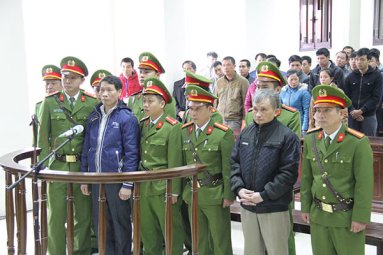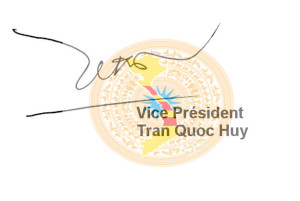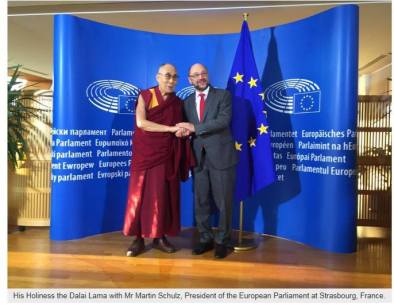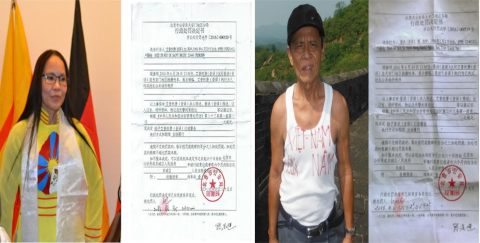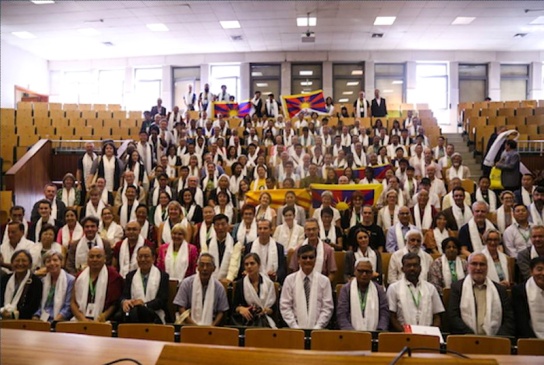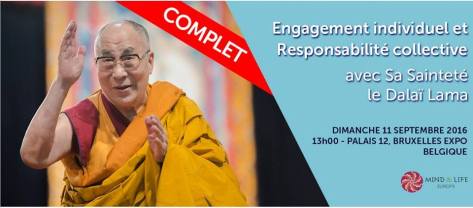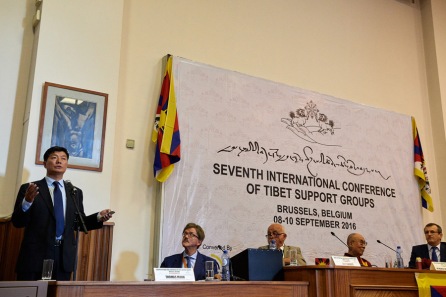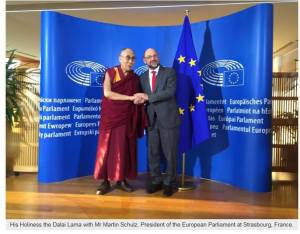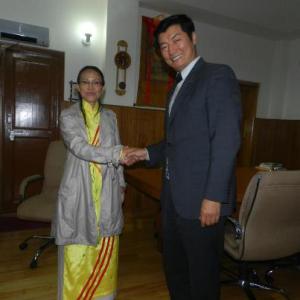
A GREAT DAY FOR FREEDOM Lobsang Sangay, Prime Minister of the Tibetan government in exile meets with Nguyen Thi Ngoc Hanh, founder of the Official Vietnam-Tibet Alliance Fighting For Freedom.
DHARAMSHALA, November 9th 2012
For thousands of years the World has been waiting for the arrival of a Savior. Maybe he’s already appeared to us in the past, shrouded in an aura of magic and mystery, or perhaps we only need to cling to ancient myths, legends and fairy tales, to continue to hope for a better World and a better future for the human race. We don’t know if this is just a dream that won’t ever come true, or if these heroes really exist and they are somewhere around us, but surely what has happened today is an important step toward Truth and Salvation. This is an important date in humankind’s history. For the first time, Vietnam and Tibet, two different universes of values and ideals, have joined together and merged into one, to reach for the same goal of Freedom, Democracy and Human Rights for the World.
It’s not easy to comprehend this special Friendship between such different people and cultural heritages, but the reasons are contained in their mysterious past.
Particularly, we need paying some attention to Vietnamese People’s Past, the most daredevil and brave lineage of warriors and fighters, the Lords of War, respected and dreaded by everybody throughout their 4,000-year history. Vietnamese people represent the origins of Asian civilization, the Lac Viet, the most ancient asian people who founded the Van Lang Kingdom in 2879 BC, with King Hung Vuong who created the first Vietnamese dynasty. Vietnamese people have always been a brave, unsubmissive, heroic, and independent race warding off invaders.
Throughout their history, Vietnamese warriors had to fight off the world’s greatest empires to protect their ancestral land, and to save their people from being dominated or assimilated into other races. (1,000 years of resistance to Chinese occupation of their lands, defeating all greatest chinese dynasties: Han, Tang and Ming, repelling the Great Khan’s Mongol Empire three times, overtaking the Champa kingdom, Khmer kingdom of Angkor, and expelling French Colonists…).
Yet the most dangerous and venomous enemy has always come from within: Vietnamese themselves. Vietnam’s history is filled with violence and terror as a result of fratricidal conflicts or feudal wars. Vietnam contemporary’s enemy from within is better known as Vietcongs (Vietnamese Communist Party), who are adept at utilizing terror to control the populace.. Vietnam’s History is a history of violence, terror and fraticides.
Generation to generation a lot of clans and dynasties used to kill each other ferociously. Even inside their families they always used to murder each other, among kings, princes, queens, princess, fathers, mothers, children, husbands, wives, brothers, relatives, friends. In Vietnam’s History, these episodes are much more frequently, cruel and horrifying than in other countries and civilizations.
The evil has always been hidden amongst the most beloved and dear buddies, the most intimate friends and closed blood relatives.
Even today, there is a very strong network of spies, corrupts, betrayers, cowards, duplicitous, double-dealings, and turncoats….and unfortunately they always annihilate the true vietnamese heroes. Throughout the course of history, a lot of heroes had been assasinated, brutally tortured
by Russians, Chinese, Vietcongs, French, Americans…
The whole world has been deceived with a lot of lies and vietcong’s propaganda. For half a century, all the vietnamese people have been victims of a reign of terror and corruption, they’ve been entrapped in a nightmare of brutality, destruction and death.
They have suffered and they are still suffering what no one could imagine, it goes beyond any human imagination. Vietnamese people has always been subjected (and even now they’re still subjected) to dirty games of power much bigger than them. For millennia, they have had to be under the influence of impostors, dictators, fake heroes and puppets of foreign powers.
A lot of true heroes have been deceived and betrayed by gangs of vietnamese dirty monsters. In the recent Vietnamese History, hundreds of heroes (both communists and not communists) were killed and tortured by Ho Chi Minh and his followers. A lot of South Vietnamese true heroes who, at the same time, oppose Vietcongs and deny to become French/USA puppets, were killed by americans, by vietcongs, or by their same buddies who had betrayed them.
Vietcong massacre of civilians performed during the Tet offensive in February, 1968
(Hue massacre, when thousand of civilians were executed by Vietcongs before they retreated from the city. A war crime that had gone unnoticed by Western media)
Even today there are a lot of infiltrators, betrayers and cowards, in each vietnamese community, in each family. The black and obscure forces, that a Vietnamese hero has to tackle, have always been absolutely impossible to overcome. This has always happened at all the levels and social positions, in any setting everybody have been involved. The wickedness and immorality of Vietnamese people can overkill any hope, and remove from you any sense and meaning of life.
You can’t manage to distinguish anymore what’s wrong or right, you don’t know anymore what’s worth fighting for. So, the vietnamese hero needs to be very astute and clever, he must have a very deep love for his country and a very strong and solid faith. Not only he has to be brave and ready to sacrifice himself, not only he has to be strong, deft and to own a limitless pain endurance… but he also has to be a genius of strategy, to have a lot of fantasy, to be able to ideate conceptions and extraordinary risky solutions, to act in cold blood, not to fall into enemy’s illusions and traps, and he doesn’t have to allow himself to be affected by feelings and emotions (he has to handle his rage, sadness, melancholy, loneliness, friendship, love…), often he has to dominate his instincts and repress his passions, he has to be prepared to fight alone against the world, against his friends and his family itself, against his love… against his heart.
These are the real elect. No saintly hypocrites, but most of them had to make a painful choice: to die in disonhor, killed by the enemy, or to die of shame, surrending and commiting suicide, to avoid the humiliation of the enemy. In both the cases, they all died and rotted alone. Most of them have been forgotten.
Vietnamese communist leaders and minions are all puppets and impostors. At the present time. there are absolutely no freedom and no democracy of any kinds in Vietnam. Human rights are seriously abused by the Vietnamese communist regime. They legally do human trafficking, selling slaves, women and children. Vietcongs are everywhere in the world, their criminal organization is much worse and cruel than mafia but they are “regular”, an official recognized government, they’re very good at telling lies.
Even a lot of vietnamese communities, groups and political parties overseas are entrapped in this corrupted system of infiltrators, duplicitous, cheaters, merciless capitalists and politics, unscrupolous deceivers playing with the pure sentiments of vietnamese people. Their influence is very powerful, they are very sneaky and persuasive.
But the lack of conscience, the lack of love….. impatience and heartlessness, hatred, selfishness, sex desires, opportunism, seek of glory, thirst for power…are our more dangerous enemy…The loss of morality, and the degradation of the real values of life, will bring Vietnamese People to their end and extinction.
Not only their country and lands (physically), not only their people, their women and children (their future)….but also their past, their millenary culture, traditions…their history, their roots, and their identity…they’re losing themselves, and without a change, it will be definitive forever, without any hope to return back…
And this poison, this eternally accursed embrace, has hit Vietnamese people until today, but althought they have always had to struggle for survival and althought they are continuously tempted to follow the evil’s path, vietnamese people can reveal themselves as very generous, valiant, gentle, loyal and fair friends, towards their compatriots and towards foreign people.
Vietnamese culture represents a multicultural mix of different mores and traditions, the ability of vietnamese people to absorb different cultures, to adapt to any situation, to know how to endear themselves to everyone, make them one of the most open-minded and well-liked people. For this reason Vietnamese heroes will always find a solution to lead, save and protect their people, it doesn’t matter how much impossible the circumstances could be.
Freedom-Fighter and poet Nguyen Thi Ngoc Hanh embodies this purest and original spirit of the vietnamese greatest women warriors of ancient times. She’s the reincarnation of a storied tradition of resistance to foreign rule, her figure is central to modern Vietnam’s struggle for independence and she has great political potency and influence on modern Vietnam’s young generations.
Her profound and visceral love for Vietnam drove her to extreme and desperate heroic
deeds during all her life. But she realized then that she could no longer be content living the life of a normal patriotic person, without doing anything really effective for Vietnam, wasting her existence with useless extreme deeds of braveness. Last year, following her Buddhist faith, she began her spiritual quest for enlightment, like Siddharta.
She set off to find the road to save her country and her people. So, she decided to abandon everything and head toward the far Himalaya’s mountains, entering the Dalai Lama’s Land. She lived among Tibetans, joining them as a sister, attempting to find release from suffering through physical discipline, enduring pain, holding her breath, fasting nearly to starvation.
When her mind had settled into a state of deep peace. She realized that instead of starvation, she needed contemplation and nourishment to build up her strength for the effort. So she decided to climb on the steep and wild moutains, and after arriving on the peak, she raised on the sky the two flags of Free Vietnam and Tibet.
This image can be compared to Friedrich’s Wanderer above a Sea of Fog, Nguyen Thi Ngoc Hanh, as a wanderer, she’s the very embodiment of the Kantian subject. Her gaze gives meaning to the world. She’s like the traveler of English romantic poetry, alive to the sublime glories of nature that open up before her during her pensive walks. Encountering nature in solitude in deepest revines, on the pinncacle of a mountain, which was about as far away from urban civilization as a Western man could get. Throught this physical and spiritual isolation, she escapes from reality and actuality and becomes a dreamer and an individualist. She withdraws from the external world and society, she relies only on her inner experience, becoming mystical and visionary, seer and prophet. Nature elevates her feelings and help her to communicate with the world of the spirit. (Not artificial Nature, but the massive uncontrollable Force of Nature). Man could find his true self in communion with Nature, he could find his soul reflected in the Soul of Nature and he could get inspiration admiring Natural beauty, so Nature acquired religious importance and moral teaching. She’s focused on nature, even while all of nature seems focused upon
her. Like a Romantic poet, Nguyen Thi Ngoc Hanh is not happy in society: other people
could not understand her sensitive feeling and she’s condemned to solitude and sadness. The interest in Nature is not for itself but as it affects the human mind and personality and finallly rusted life passions of men are incorporated with forms of Nature. She asserts her spiritual autonomy , she’s a rebel, she’s proud of her aristocratic set- apartness, apart from the mass of mediocre men.
She doesn’t share many of the society values, she lacks common background of faith and aspiration…growing a feeling of uneasiness and isolation. She does not speak on behalf of society, on the contrary she rivolts against. She prefers nature, solitude and few pure people to the company of other men.
She wants to explore her own emotions, so she has necessarily to stand outside of the throng of money-making, political gimmickry, and urban noise in order to assert and maintain her positions.
Nguyen Thi Ngoc Hanh is representative in our generation in liberty and in her haitred for tyranny and costraint, excercised by individuals or by societies. She wishes to realize her powers to be herself, not to compromize with hypocrisy. For her, the failure of Ho Chi Minh’s Vietnamese Communism is a challenge to put her ideals into action, she believes in true liberty and in the importance of the individual man.
Her conception of liberty is more istinctive than intellectual, she insists on being free attacking tyrans pleading the cause of oppressed people. She rejects the belief in Communism Dictatorship, she is true to Freedom and to the Romantic outlook.
In her devotion to an ideal Vietnam which one day won’t be a dream anymore, she’s faithful to this ideal.
Comparing her to Delacroix’s Liberty Leading the People, she’s very similar to this Liberty personified in the form of a vibrant, rebellious woman who leads the people to victory. She carries the flag proudly. She felt it was her duty to fight.
In the deep of their souls Vietnamese people don’t love War, they always desire true peace and justice. In their history before fighting they have always tried to find a compromise with their numerous and powerful enemies: concluding armistices, donating gifts and lands to them, sacrificing and betrothing some princess or the king’s younger daughter.
But most of the times after few years of peace, the enemies always used to break the pacts, becoming cruel, spoiling the kingdom, enslaving Vietnamese people and even
or this reason, is very closed to Tibetans. Vietnamese people detest violence and conflicts.
This is the message of Nguyen Thi Ngoc Hanh to Tibetans:
committing mass murders.
So, f
the real, pure and original Vietnamese people’s nature
But even when the situations are drammatic, and the society seems to have become completely shattered and spoiled by the dark and corruption, even in these extreme circumstances when there is nothing more to do by now, always a New Hero Will Rise to save the oppressed people.
| “Dear My Tibetan Friends, The way to freedom is hard, bitter and full of pitfalls, but together we will speak up all our |
| sufferings to the whole world. Our heart is broken, plagued by a thousand of indelible wounds and humiliations. But we will never surrender, we will continue to fight on behalf of our children and future generations. We won’t never give up hope, until our last breathe we will bring our message to the hearts of mankind! You are not alone, Tibet and Vietnam are still fiery alive, we won’t die, we will rise again from the shadows of darkness. History is ours, and together we will make history, we need to change the destiny and save our people. Together we can change the world, we can bring the light that will shine on this abyss of terror, brutality and corruption. We need to heal these innocent souls, ripped and lacerated by cruelty and violence, it’s our duty, our mission… The human beings are going towards the path of evil and insensibility. Whatever happened to these frozen hearts? A generation lost in pace… wasn’t life supposed to be more than this? We must be aware that only Free Vietnamese Heroes will be able to lead Tibet to its salvation from China’s yoke and prevent the extinction of Tibetan People. But Vietnamese people and the whole World really need Tibetan people and their culture, their precious philosophy and teachings of life… you can really save the World, save all of us from our self-destruction. Keep your faith. We really trust in you and we have an immense respect and a deep and fervid love for all your people. I promise, we will be the voice of all those forgotten souls, forced to sacrifice themselves burning their bodies and self-immolating for the love of Tibet Land and for the destiny of their people.” |
In the whole History, Vietnam and Vietnamese people have always used to be the “Hot Point” and the “Fulcrum” for the Equilibrium of Asian Empires, and recently Vietnam has become the center of the balance for the Destiny of the whole World. The World’s Peace and the Human Race’s Salvation depend from this little country and from its brave people.
Because only Vietnam can bring to life the Hero who will lead the Humanity and Free the World from the Unjustice and from the Human Rights abuses. Several centuries ago, Vietnamese Heroes has already safe Korean People and help them to defeat the powerful Mongol Empire.
Lý Long Tường was a prince of the Ly Dynasty of Dai Viet. Ly Long Tuong, together with 6000 mandarins and servants departed from the Than Phu (now Thanh Hoa Province)
estuary and fled to the South China Sea in three large ships. Legend has it that the Korean king Kojong of the Goryeo Dynasty had dreamt of a grand phoenix flying from the south and landing in his nation. Therefore, he ordered the local government of Hae-ju to give the Vietnamese royal refugees a red-carpeted welcome and allow them to live in a manor in his country.
Tuong and his companions started their culture of fishing and breeding. He also opened a school for literature (poetry, rhythmical prose and worship rituals) and a school to teach martial arts – the art of war. Thousands of local students joined his two schools.
In 1232, an army of the Mongol Empire led by General Sartai launched an attack on Korea by both sea and land. The troops, using the waterways, attacked Hwang-hae but were defeated by the army and the local inhabitants led by Ly Long Tuong. Ly Long Tuong always rode a white horse and as a result, was dubbed the “White Horse General.”
In 1253, The Mongol army led by the great Khan Mongca launched a second attack on Korea. The Yuan-Mongol army, led by Tang Ji, attacked Hwang-hae overland and by using the waterways. Ly Long Tuong, although by then over 70 years old, led the army and the local inhabitants to victory after a five month campaign. As a result of this important triumph, the Korean king renamed Chen-san (Hangul: ; Hanja: 鎭山) Hwa-san ( 花山) and appointed Ly Long Tuong Hwa-san a General. The location of the Mongol army surrender was called the Gate of Surrender Acceptance (受降門; Su-hang-mun). The Korean king also had a pillar erected here to honour Ly Long Tuong.
During the private meeting of today, Dr Lobsang Sangay, Prime Minister of the Tibetan government in exile has said these words:
“I’m very honoured to meet such a brave lady who has a very deep and fervid love for her country, Tibetans are so proud to have Free Vietnamese beside them as their ally to the fight for Freedom, Democracy and Human Rights. Considering the incredible Vietnamese’s History, I’m sure Vietnam won’t never fall under the dominion and supremacy of Chinese Communist Government.”
Nguyen Thi Ngoc Hanh told him this: “You are a great pride for Tibetans, after doing a great career in USA you decide to return to serve your nation, to support and lead your people to Free Tibet from Chinese oppression. You very love your country and you’re a model of Justice and Patriotism for your people. I hope you can become a model for Vietnamese youngs too.”
For the Buddhists followers and for Orientals, the Lotus flower is the symbol of beauty, purity and perfection, symbol of the sun, of the sky, of the earth, of creation, of past, present and future; so it represents the very Life. It represents the self-creation, the earth creation from chaos and, at the same time, light and order, the evolution of the world and of mankind. The peculiarity of this flower is due to the fact that it grows in the mud and in swampy waters, in dirty and turbid areas, but despite that it keeps pure and scented and it’s not influenced by the environment. For this reason it also represents the fight for Life. The filth and dirt of the mud represent difficulties, problems and unfavourable conditions we have to face everyday. The Lotus flower represents the overcoming of these obstacles and of these hard moments. It is easy to be overwhelmed by negative things, by bad thoughts and give up everything, but our Lotus Flower’s festival is the emblem of positive thinking, something beautiful, even if its roots lie in the mud, that always lays in the surface of the stagnant water, it comes from them spotless and beautiful. For this reason it is the symbol of a person who lives in the world without being contaminated.
Mr. Soepa Alias Phuntsok Wangdu, The President of the “Viet Nam -Tibet Alliance Fighting for Freedom”
The “Viet Nam -Tibet Alliance Fighting for Freedom” is the only Unique and Official organization really fighting for Freedom, Democracy and Human Rights for Vietnam and Tibet. The people of this organization have sacrificed all their life for their people, they have endured every kind of suffering and pain for the love of their country.
SOME CLARIFICATIONS ABOUT VIETNAM FLAG
The National Flag of Free Vietnam is not only the Former South Vietnam’s flag, but the
ONLY AND TRUE FLAG OF VIETNAM.
It has yellow background and three horizontal red bands in the middle of the flag. The yellow background represents the ancestral land and the skin color of Vietnamese race. The yellow color also represents earth (one of five elements – metal, wood, water, fire, and earth) symbolizing the territory and the national sovereignty. That is why the oriental emperors in the past wore Hoang Bao (yellow imperial robe) and proclaimed themselves Hoang De (Yellow Emperors).
The red color represents fire (one of five elements mentioned above). The red color is also the color of the South and symbolizes a brave, unsubmissive, heroic, and independent race in the south region, Vietnam, which is separated completely from the north region, China.
The three red bands represent the vietnamese blood, unifier of the three regions of Vietnam: North, Central, and South. But, these three regions unite in the national home, the home of Vietnamese people, who always love and protect one another.
In 40 AD, the Trung Sisters, on the elephants’ back, waved the Yellow Flag to fight against the Chinese invaders to regain independence for Vietnam. Since that year, the Yellow Flag appeared for the first time in the Vietnamese history.
The National Flag of Free Vietnam has been formed from the sacred energy of sky and earth of Vietnam together with indomitable spirit of Vietnamese people during almost two thousand years of history since this flag was officially adopted by an Ordinance. It represents the peaceful opportunity, the everlasting success, and the imposing victory of Vietnamese people.
The National Flag of Free Vietnam has been ups and downs with the Vietnamese people’s imposing history. It represents democracy, freedom, human rights, brave will, peace and prosperity, and unity during the course of building and protecting the country of Vietnamese’s ancestors.
The National Flag of Free Vietnam is not solely the property of any regime or any government. It is the state property of free Vietnamese people. Should a regime be rotten or a government be a lackey to foreign powers, the Free Vietnam National Flag does not risk a bad reputation. The Vietnamese people have to eliminate that regime or that government to protect their ancestors’ flag colors. We cannot rely on the argument that the previous regimes or governments were no longer existed in order to be indifferent to this flag.
The National Flag of Free Vietnam is the nation’s soul. The righteous cause, the fighting morale, and the unanimous unity depend on the presence of this flag. The Free Vietnam National Flag is a denotation to identify those who are Vietnamese freedom-loving people and those who are Vietnamese Communists and their servants. Where there is a National Flag of Free Vietnamese, there are love, democracy, freedom, and human rights.
At the present time. there are absolutely no freedom and no democracy of any kinds in Vietnam. Human rights are seriously abused by the Vietnamese communist regime.
During the course of fighting for freedom, democracy, and human rights of the people in Vietnam, real vietnamese people must have their whole-hearted support to maintain and wave high this National Flag of Free Vietnam until the freedom, democracy, and human rights are finally realized in Vietnam.
The great majority of the anti-communist Vietnamese organizations recognize the National Flag of Free Vietnam and consider this flag to be the soul of the unity and the struggle for just cause.
The National Flag of Free Vietnam continues to be the official emblem of Free Vietnam for the freedom-loving Vietnamese people in Vietnam and abroad.
The – Freedom – Democracy – Human rights – Loving Vietnamese – should always preserve the National Flag of Free Vietnam and together unite under this flag to fight for Freedom, Democracy, Human rights, well-fed and well-clothed condition, happiness, peace, and prosperity of Vietnamese people in Vietnam.
The National Flag of Free Vietnam also means human rights for Vietnamese people too.
With the glorious history of almost 2 thousand years of the National Flag of Free Vietnam, free vietnamese people hope, in the near future, the National Flag of Free Vietnam – yellow background with three red bands – will be fluttering so numerous as to cover the whole Vietnamese sky.
Contrast With The Vietnamese Communist Flag
The “yellow star on red background” flag of communist Vietnam called the Social Republic of Vietnam (SRV) first made its official appearance in September 1945, when Ho Chi Minh proclaimed the independence of Vietnam. As the SRV is now recognized by the United Nations and many nations in the world including the Unites States, its flag is questioned by all free Vietnamese around the world, including Vietnamese Americans.
Firstly, it is the symbol of a party imposed on the Vietnamese since August 1945. It was the official flag of the Indochinese Communist Party (1930-1945). Secondly, it is an international flag, not a national flag. each point of the yellow star represents one of the five protectorates of the Union of French Indochina: Tonkin, Annam, Cochinchina, Cambodia, and Laos. By maintaining this flag, communist Vietnam on the one hand, harks back to a period of French colonialism, while on the other hand, keeping alive the imperialist ambition of an Indochinese Federation under Hanoi’s thumb.
Thirdly, it is a communist flag. The blood red color of the background refers to the violence of class struggle and the ultimate victory of the proletariat revolution throughout the world, as proclaimed by international communists. But international communism is dead with the downfall of Soviet Union in 1991.
In brief, the Vietnamese communist flag symbolizes an antithesis to the very idea of freedom and peace that Vietnamese Americans and free Vietnamese around the world want to foster in our community and in generations of younger Vietnamese.
A Choice of Hope and Love of freedom To Vietnamese refugees, the Vietnamese Communist flag is a nightmare and a reminder of death. It is a blood-reeking flag under which some three and a half million Vietnamese lives have been sacrificed for the war-mongering goals of the Communist Party of Vietnam (CPV) as proclaimed in Hanoi’s national anthem, “Forward, Soldiers!” which says in part: “We swear to tear our enemies apart and drink their blood!”. 30,000 landowners were lynched to death or summarily executed by Vietnamese communists before the 1954
Geneva Agreement. Some 10000 civilians were shot and buried alive during the 1968 Tet Offensive. 80,000 religious leaders and political prisoners have been executed in “re- education” camps since 1975. Most Vietnamese Americans, having fled persecution and reprisals, find the display of the “yellow star on red background” flag insulting, offensive, and culturally insensitive. It is like flying the swastika flag of Nazi Germany in the presence of Jewish-Americans.
It is the same flag that decorates the medals on the chests of million Vietnamese who have fled communist totalitarianism since 1975 and have successfully resettled in “the Land of the Free”, the “three red stripes on yellow background” flag will always be a symbol of hope and love of freedom. It is the banner around which all free Vietnamese identify themselves and rally – as long as the dream of a free Vietnam remains alive and well.
This slideshow requires JavaScript.

